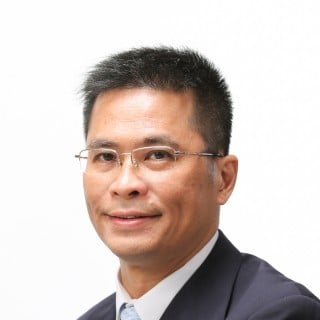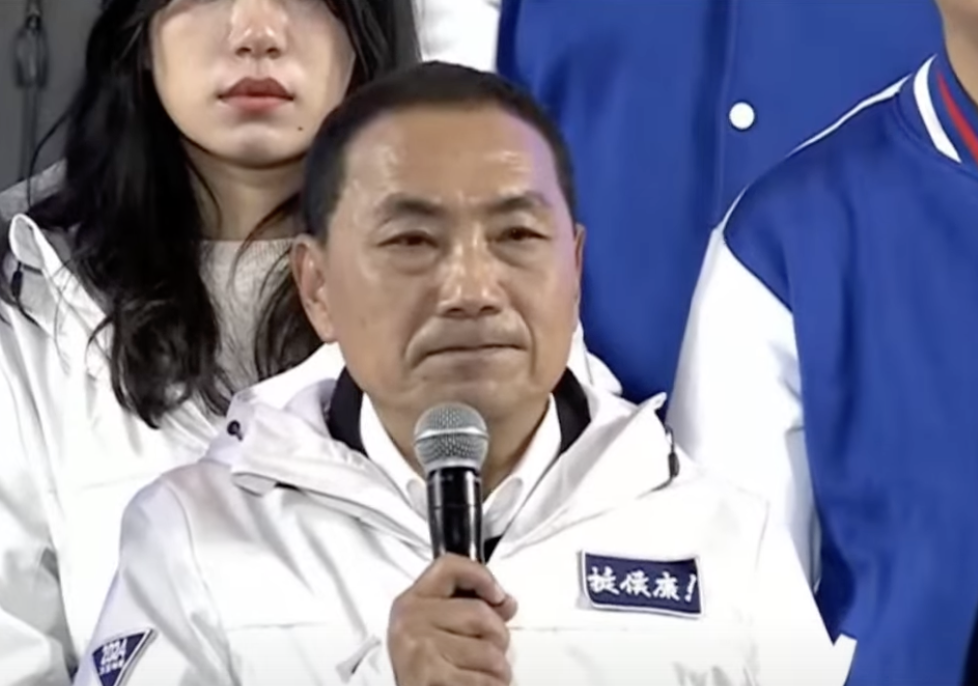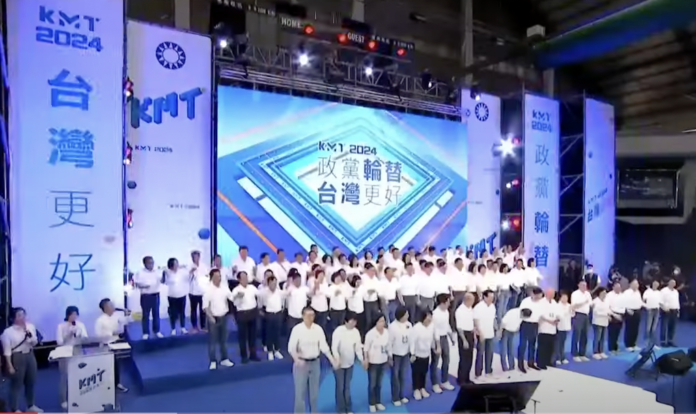After the legislative and presidential elections in Taiwan, the Kuomintang (KMT) has been undergoing internal transformations and dealing with external politics dynamically.

In early March, the KMT renamed its Huang Fu-hsing branch of the “veterans service working committee.” The branch was established in July 1956 by the late Chaing Ching-kuo, at that time a minister of the Veteran Affairs Commission, to mobilise the military personnel’s support of the KMT. Its membership declined from an apex of 200,000 members to only 80,000. The restructuring move aimed at eliminating any tendency of “a party within a party.”
Moreover, the KMT Central Standing Committee (CSC) has recently selected 27 members, but the party constitution says that the maximum number of CSC should be somewhere between 35 and 40, and that 29 CSC members should be elected. When the election of the CSC was called in late January 2024, there were 30 members registering for the election. However, three of the 30 candidates failed to complete their registration details, leaving 27 members competing for 29 positions. This meant that all the 27 candidates were easily elected, showing the lack of interest of party members to run in the CSC election. Critics of the current party structure, including some younger “blue” scholars, pointed out the absence of “intra-party democracy” within the KMT, where the CSC, according to their views, lacks substantial powers and whose members shoulder “heavy responsibilities,” such as organising donation campaigns and even paying for their transportation costs to attend the meetings of the party centre.
Critics have also argued that the KMT is internally “undemocratic” even compared with the other two large political parties in Taiwan, namely the Democratic Progressive Party (DPP) and the Taiwan People’s Party (TPP). The DPP’s Central Standing Committee has coopted the directly elected county mayors, elected municipal councillors, and representatives of the directly elected members of the Legislative Assembly, thereby providing a necessary institutional linkage between the party headquarters and the elected party members at different levels of the political institutions. Currently, among the 17 members of the DPP’s CSC, 11 are directly elected politicians.
Nine progressive members of the KMT formed a group named “Open Party Laboratory,” indicating that while the KMT’s CSC had 27 members during the last term of office, 10 of them were directly elected politicians. Nonetheless, in 2024, only one out of the 27-member CSC in the KMT is directly elected. The result is that, according to the Young Turks, the KMT headquarters tends to be “detached” from the directly elected politicians. In February 2024, the progressive group advocated that the directly elected mayors and the parliamentary leaders should be coopted as ex-officio members of the KMT’s CSC; nevertheless, its view was not heeded seriously by the party centre and leadership.
In terms of the participation of KMT members in voting for their CSC members, their participation rate is comparatively lower than the past. Overall, there were 1,968 representatives eligible to vote for the CSC members, but only 1,263 members registered to vote as some did not pay for their party membership fees. The KMT claimed that 79.33 percent of its representatives in the party congress voted for CSC members. However, critics said that the voter turnout was much lower than 79.33 percent, namely 50.91, because those who did not pay their party membership fees should be included in the calculation. Regardless of how the voting turnout was tabulated, critics said that the 79 percent turnout was lower than the 90 percent turnout in the past.
The problem of the KMT’s internal organisation was that, according to critics, the Ma Ying-jeou leadership diluted the influence of the KMT’s CSC by trying to “avoid” the party headquarters to interfering with party policies. Party policies were decided by a core group of KMT heavyweights and elders inside and outside the Legislative Yuan. Many party heavyweights and elderly leaders did not want to run in the CSC elections. It is reported that the current CSC does not really have a say on the candidates running for the 2026 and 2028 local elections because the party elders and elected politicians tend to have a more influential voice.
In the 1920s, The KMT adopted the Leninist style of leadership and the principle of “democratic centralism,” making its CSC quite powerful with a respectable status. At that time, the KMT Central Committee (CC) members elected the CSC members, enhancing the CC-CSC linkage. However, with the passage of time, the KMT revamped the CSC election method by empowering the party representatives to vote for CSC members in the party congress. Although some CSC members come from the Central Committee, the current CSC lacks sufficient legitimacy because some of the elected CSC members were those who gained relatively fewer votes in legislative elections.

As early as November 2018, KMT party member Lu Shiow-yen, who was elected as Taichung mayor at that time, advocated that the directly elected KMT mayors should become ex-officio members of the CSC for the sake of enhancing the CSC representativeness. In response to Lu’s suggestion, the KMT party chair Wu Den-yih invited 15 elected KMT mayors to sit in the CSC as observers without the power to initiate motions and to veto party policies – a symbolic move that did not really strengthen the institutional linkage between the party headquarters and the elected KMT politicians.
Interestingly, when the DPP was formed, it imitated the organisational structure and arrangements of the KMT. The DPP party chair is directly elected by all party members through the “one member one vote” system, but the CSC members are elected by the Central Committee members. The DPP’s internal politics are characterised by factional politics and rivalries, as with the case of the KMT. However, the way in which the DPP’s CSC is elected is more Leninist and traditional, with a direct linkage between Central Committee members and CSC members, unlike the KMT whose reform has weakened the direct CSC-CC connections. Most importantly, so long as the CSC coopts directly elected county mayors and representatives of the elected legislators (11 out of 17 DPP CSC are now directly elected politicians), the connections between elected politicians and the party headquarters are much closer in the DPP than the KMT arrangements.
Compounding the lack of legitimacy on the part of some KMT’s CSC members was that it attracts a particular faction to become dominant, such as the current Eric Chu faction whose members now have an influential voice in the CSC. This is not surprising, as the KMT CSC in the past was also shaped by factional politics. However, given the fact that the previous KMT party leaders and elders, such as Ma Ying-jeou, have traditionally maintained an influential say in the party’s direction, ranging from the support of Hou You-yi as the candidate for the 2024 presidential elections to the abortive attempt at forming an alliance with the Taiwan People’s Party, any factional control of the CSC will have to encounter other factions, including the faction composed of directly elected politicians and the one comprised of the party elders and former leaders. As such, the future reforms within the KMT’s CSC will deserve our attention and observation. It remains to be seen whether Eric Chu, the current party chair, would perhaps initiate a move to revise the party constitution and to strengthen the institutional linkage between the CSC and elected politicians after the May 2025 party chair election.
While the KMT’s internal reform remains an unresolved issue, its elected president of the Legislative Yuan, Han Kuo-yu, has been dealing with legislative politics with some controversies. He supported his party member Fu Kun-chi in the legislature to initiate two bills, one on the high-speed railway surrounding the island of Taiwan and the other on an extension of highway number 6 in Hualien city. The DPP criticised Han for “violating” the principle of neutrality as specified in the Legislative Yuan’s standing order, but strictly speaking, the standing order does not mention clearly whether the president is disallowed to sign his or her name to second or support a bill in the legislature. During a house meeting in the Legislative Yuan on March 15, Han Kuo-yu grasped the opportunity of the absence of DPP members, asking legislators three times whether they had opinions on the bills during the first reading. No DPP member was present, and Han ended the meeting with the two bills passing through the first stage. Of course, DPP members would likely give the KMT members a hard time in the committee process and second reading, but the way in which Han handled the KMT-initiated bills demonstrated a political tug-of-war between the KMT and the DPP in Taiwan’s new legislative politics.
To counter the KMT influence in the legislature, outgoing Taiwan leader Tsai Ing-wen of the DPP met Ko Wen-je of the People’s Party on March 15 at her “presidential” residence. This was the first time that Tsai met Ko six years after they had met in 2018, when the DPP tried to negotiate with Ko who at that time was an incumbent Taipei mayor running for another term. That meeting in 2018 failed to achieve any consensus, but Ko won with a narrow margin of votes by beating Ting Shou-chung of the KMT and Pasuya Yao Wen-chih of the DPP.
After the legislative elections in early 2024, the DPP clearly attempts to woo the TPP into its umbrella of cooperation and consensus, trying to establish a so-called “party communication platform.” The KMT criticised Tsai’s move as putting up a “political show.” Given that the TPP is holding eight seats and can become a kingmaker in any bills and motions, its bargaining power naturally attracts the attention of the DPP and KMT.
Finally, the KMT has been conducting its external politics by sending vice-chairman Andrew Hsia on March 14 for a seven-day visit to the mainland. Hsia is visiting the cities of Chongqing, Chengdu, Jinan, and Qingdao, meeting Taiwanese businesspeople and “friends.” He emphasised the importance of accepting the 1992 consensus and engaging in dialogue with the mainland. As a former director of the Mainland Affairs Council under the Ma Ying-jeou leadership in Taiwan, Hsia can perhaps be regarded as one of the bridges between the mainland and Taiwan at a time when the ruling authorities in Taiwan refuse to accept the 1992 consensus.
In conclusion, shortly after the KMT’s impressive performance in the 2024 legislative elections in Taiwan, its internal reforms have become the spotlight of some Young Turks within the party; its legislative politics are increasingly prominent in a legislature where the People’s Party is going to be a kingmaker in deciding the fate of bills and motions; and its external politics with the mainland are going to be an area that deserves further observations. Although the KMT is an opposition force in Taiwan’s domestic politics, its future reforms, legislative rivalries with the DPP and possible coalition politics with the People’s Party, and its external relations with the mainland will become a crucial indicator of not only Taiwan’s political development but also the dynamic relations between Taiwan and the mainland.
*Sonny Shiu-Hing Lo is a political scientist, veteran commentator, and author of dozens of books and academic articles on Hong Kong, Macau, and Greater China




















